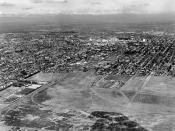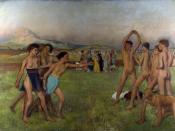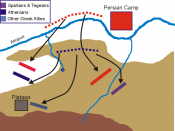Education"All the education was designed to produce prompt obedience to authority, stout endurance of hardship and victory or death in battle" - PlutarchSeven to Twelve Yearsâ¢Boy left home to live in barracksâ¢They were enrolled in companies, or herds, according to Plutarch. This was to accustom them to learn, live and play as a groupâ¢Placed under the authority of the paidonomus, or "boy herder", a magistrate charged with supervising educationâ¢An older youth (around 20 years old) directed them. He combined common sense with a great fighting spirit.
â¢Xenophon suggests they had whips for floggings.
â¢"â¦kept their eyes on him, the (paidonomos) responded to his instruction, and endured their punishments from him, â¦this training servedâ¦in learning ready obedience" - Plutarch the paidonomos had the ability to physically punish the young Spartan boys in an attempt of gaining control over them and teaching them to be obedient.
â¢"â¦he (paidonomos) had authority to hold musters of the boys, and as their overseer, in case of any misbehaviour, to chastise severely" same as aboveâ¢Boys were introduced slowly to the full rigours of discipline and competition.
The Spartan elders took great care to ensure that the boys in this age group were set a program which was not too rigourous and that allowed steady physical growth. - Aristophanes, Lysistrata the elders were aware of how the boys matured. If they worked them like a Spartiate at the age of 7 -12, they may die or severely injure themselvesâ¢"The objective of this first stage of education was very simple: to develop the physical strength of the children and teach them to live together and to show obedience". - Barrow the 7 - 12 age bracket was only to teach the boys teamwork and begin to develop their strengthâ¢"They learned how to look after themselves, how...


